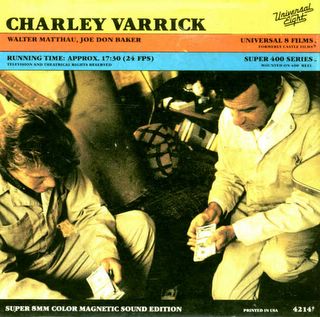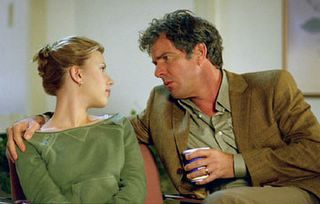I had to look this up. In England, around the turn of the century, a cartoonist named David Low created a famous character named Colonel Blimp. He's a buffoonish old man, a blowhard convinced that everything was done better in his day, and that the younger generation doesn't understand manners and proper behavior and blah blah blah. You get what I mean. It was initially created as a way to mock the supercilious British military class.
Filmmaking team Michael Powell and Emeric Pressburger took this famous character and, in 1943, during the height of the Second World War, created their best-loved collaboration, a staggeringly entertaining and surprisingly modern look at aging, the changing face of warfare and the true nature of friendship. The Life and Death of Colonel Blimp defies classification. It is a sweeping work of true cinematic art.

Blimp was initially intended as war propaganda for the British, yet it deeply offended Churchill prior to its release, and almost never saw the light of day. It tackles themes I have never seen in films before, and does so in a way that's never preachy or over-bearing. We follow Clive Candy (he's not actually called "Blimp" in the film) through three wars. Yet this is not the story of his gallantry in battle, nor of the lasting toll that a lifetime of fighting in conflicts has taken on him. Instead, it's a look at how he learns to accept a changing world, how he modifies his behavior (or, more frequently, refuses to) and gets left behind by life.
We're introduced to Candy in what would have been the present for a 1943 audience. Blimp is an old man, running a batallion of the Home Guard after having been retired from active duty in the British Army. He has planned a war game that is scheduled ot begin at midnight.
However, a young opponent, in an attempt to incorporate enemy tactics into the game, decides to begin the invasion early, "capturing" Candy while he relaxes in a Turkish bath. And here we begin a series of flashbacks, beginning 40-some years prior during the Boer War.
Quick history lesson: The Boer War was a conflict Britain engaged in around 1889 against Dutch settlers (called Boers) in South Africa. It was the last of Britain's major colonial wars for empire.
So, Candy has just returned to England from South Africa, and he hears word that a defector from the British Army whom he knows has been spreading vile propaganda in Germany. Ignoring the orders from his superiors, he goes to Berlin and meets up with the plucky Edith Hunter (the first of three roles played by the fetching Deborah Kerr). She's a British National who's very concerned about England's reputation in Germany.
Without spoiling this review with endless details from the film (though it's a long plot-heavy affair at 2.5 hours), Candy winds up in the unfortunate situation of having to duel a German officer whom he's never met, the amusingly named Teo Kretschmar-Schuldorff (hereafter Teo). The two men become fast friends as they convalesce together following their ill-fated duel.
And it's this friendship that will become the centerpiece of the movie. Candy falls in love with Edith, but she winds up with another man, and he leaves Berlin heartbroken and alone. We skip ahead to WWI, where Candy will once more meet up with his old friend (this time, under less than ideal circumstances). And, eventually, we will see the WWII years, with Candy leaving the British Army due to his advancing age, and meeting up with his old friend who has fled Germany and the Nazi Party.
These different eras are all beautifully realized. Powell and Pressburger make use of simply stunning, bright Technicolor cinematography, and the attention to detail threaded throughout their film brings the entire production to life. Roger Lively's performance as well consistantly surprises. Candy is an entirely lovable character. In his rundown on the film, Ebert notes that perhaps Powell and Pressburger's greatest achievement in Colonel Blimp is taking a familiar stock character - the mustachioed military braggart - and turn him into a charming, self-effacing hero. We follow him in his relentless pursuit of a woman to take the place of his beloved Edith, even though we realize he'll never fill the void in his heart. We nod our heads in agreement as he stresses that Britain can win wars without resorting to indecent behavior, even though we know the Nazis were not the kind of enemy to be taken lightly. And we can't help but sympathize when the Colonel realizes that his career and his life have passed him by.
In many ways, Blimp is a lamentation for a more civilized time. Candy sees the 20th Century as a time when the old ways of doing things, the proper and above all British way of doing things, has given in to a chaotic system of winner-takes-all.
In one amazingly realized sequence, Candy invites his friend Teo to a dinner party of British politicians and generals immediately following Germany's surrender and the end of WWI. The British men all embrace Teo, and Germany, arguing that a weak Germany does Britain no good. The terrific performance by Austrain-born Anton Walbrook shows us Teo's frustration - he loves his friend and wants to join the optimism, while also knowing that his country will come to exploit this sportsmanlike conduct in the years to come.
Because Teo has seen the destruction of Germany, he knows of the desperation that was to come in the Weimar Years, and he has already sensed what Candy will come to discover much later - that there is no going back. That Nazism killed off any hope there could ever be for a "civilized" conflict. That the only 20th Century War would be total war.
Is this a completely fair argument? Was any war ever really gentlemanly in the way that Candy seems to imagine? I'd say, no, but the film is much more about Candy's perception of these conflicts than any objective reality. It's not that war was any simpler back in the days of his youth. In the opening days of the Boer War, in fact, Britain faced a devastating series of losses in Magersfontein, Stormberg, and Colenso. Surely Candy couldn't feel nostalgic for what has come to be known as the Black Week.
What Candy is really nostalgic for is his lost youth, a time when the world made more sense to him, and he was a young hero instead of a useless old blowhard. We get a rare chance to look behind the blustering caricature into the soul of a real man, a hero who is nonetheless full of weakness and regret, and this gives the film a rare relevance.
I have spoken of the lush, beautiful cinematography but not of the full visual grandeur of this film. It's full of as much visual trickery and iconic style as Citizen Kane, though it lacks that film's sense of gothic irony. And some of the techniques here, like the seemingly unbroken shots thattie together sequences set decades apart, feel as modern as anything done by Martin Scorsese or Wes Anderson.
But hearing me prattle on endlessly about this film will do you no more good. You're just going to have to see it for yourself. And if it sounds like something of a chore from this review, I've utterly failed to do my job properly. The movie is above all else a comedy. As I said, Candy is a delight to follow around. He's got a flip, surprising wit and surrounds himself with similarly amusing people. Powell and Pressburger never let the film's weighty themes drag it down or make the proceedings maudlin. Despite the film's title, their focus rests entirely on Candy's love of life and the passionate way in which he lived, and not on the pain or regret that in some ways come to dominate his august years.






